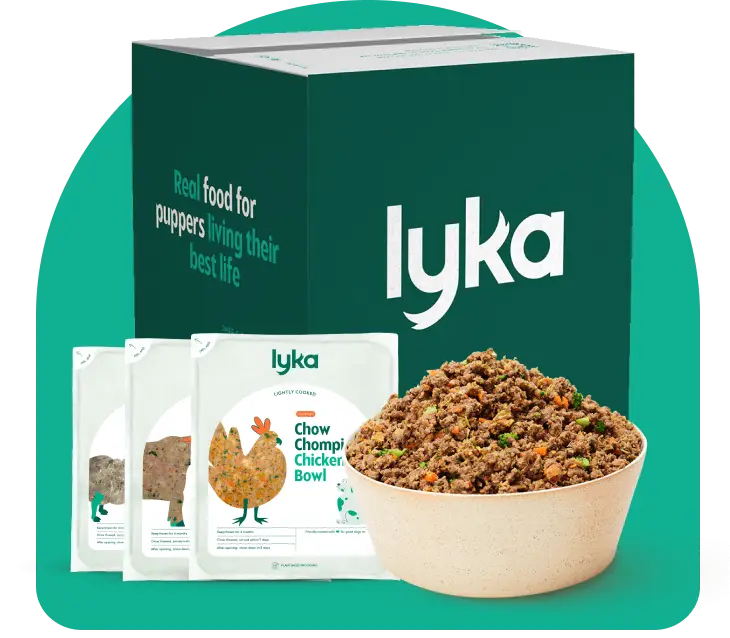How to avoid dog dehydration in your pup
By Helene Mann

When we think of keeping our pups healthy, great nutrition and plenty of regular exercise quickly leaps to mind. But it’s plain old water that’s really fundamental to life, and keeping your pupper properly hydrated is essential to their health and wellbeing. Dog dehydration is more than just thirst, and can lead to serious health problems if left untreated.
Why is hydration important?
Like you, at least 60% of your dog’s body is water, so being well hydrated is essential to helping keep their bodies functioning properly, in almost every way – including their brain, nerve and muscle function, digestion, keeping joints lubricated and regulating their body temperature.
So, how can dog dehydration happen?
You’ve got the water bowl filled, so how can your pupper still become dehydrated? It’s important to remember that dog dehydration is not the same thing as thirst. Feeling thirsty is your pup’s natural reminder for them to rehydrate – but dehydration doesn’t always have thirst as a symptom. A number of factors can cause it:
Active exercise and hot weather will naturally dehydrate your pup, or they may become dehydrated simply by not drinking enough (some puppers just won’t drink much water without active encouragement)
Senior dogs tend to drink less water as they age, so they’re more at risk
Puppies, smaller dogs and nursing mummas are also more prone to becoming dehydrated
Dog dehydration can be linked to other illnesses such as kidney disease, urinary tract infections, diabetes and even gluten intolerance if it causes diarrhoea
Dehydration can also result from sicknesses like vomiting, diarrhoea, heat stroke or any kind of illness which causes a fever
The science behind dog dehydration
It may sound complicated, but the reason dehydration happens is quite simple. When your dog loses fluid and becomes dehydrated, important electrolytes including sodium, potassium and chloride are also lost. This upsets the body’s finely tuned balance of electrolytes that normally help muscles and nerves function. At its most serious level, dehydration can lead to failure of the kidneys or other organs, so staying hydrated is really important for your pup’s health.
How can I tell if my pup is dehydrated?

If a day has passed and your pup has refused to drink, then suspect dehydration. There are a couple of easy ways to check:
Gently pinch the loose skin between the shoulder blades to make a ‘tent’, then release it. If your pupper is well hydrated, the skin should spring back almost immediately (in older dogs this may happen a bit more slowly). If it takes a few seconds, your pup may well be dehydrated.
If you gently press your dog’s pink gums above their teeth, you’ll see the gums momentarily turn white when you remove your finger. They should, however, return to pink almost instantly. If this takes more than a couple of seconds, your pup could be dehydrated.
Dry nose, panting and thick saliva are other obvious signs of dog dehydration, and always check if your pup appears unusually lethargic.
How should dog dehydration be treated?
Encouraging your pup to drink – cool, fresh water is best, or you could try adding ice cubes or a little meat broth. If they are showing symptoms of dehydration and are refusing to drink, vomiting after drinking or you suspect heatstroke, take your pupper to the vet immediately. It’s vital to get them rehydrated as quickly as possible, and if necessary, your vet can administer electrolyte fluids, usually through an intravenous drip, to help get things back to normal.
Tips for preventing dog dehydration
Keep a bowl of fresh water out for your pup at all times – remember your pup may need more to drink during hot weather
Most dogs will drink whenever they feel thirsty, but if your pup is a fussy drinker, try changing the water more frequently, or offer a different type of drinking bowl
If you feed your dog dry kibble (which can contain as little as 6% moisture), additional water is especially vital, but you can avoid that concern by feeding your pup a fresh diet with a higher water content – like Lyka!
Moisture-rich, delicious nutrition

Lyka meals contain around 70% moisture which makes them an easy source of hydration, especially for dogs that don’t drink regularly. Hydrated, healthy and happy – it’s all part of helping your pupper live their best life.





